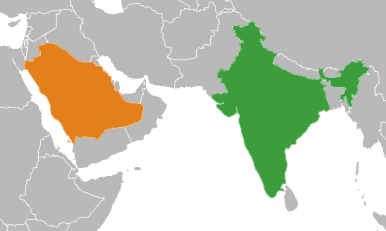Introduction
The Indian Government which opted for major economic reforms in the year of 1991, to open its restricted and over-protected market regulatory policies to the world, became the triggering point and laid down foundations for a new business friendly India. Since then, the Indian Economy has grown at a tremendous rate and today is termed as one of the major and fastest growing economy in the world. Within the span of these 25 years from 1991-2016, India’s interactions with foreign companies and businesses have resulted in the Indian market to be considered as one the most attractive investment market in the world after China. To maintain the status and progress of the country the laws and regulations governing the market are constantly monitored and updated by the government, to keep on providing a free and fair Indian Market to the world.
Advice 1
My first advice to an entrepreneur from the Middle East wanting to expand his business to India will be a general advice on the present ways for all Foreign Businesses to enter India.[1]
As per the present laws and regulations a foreign company has two options to enter India to do business, which are:
- By setting up a Non-Corporate entity –
- As a Liaison Office
- As a Branch Office
- As a Project Office
- By setting up a Corporate entity –

- As a Wholly Owned Subsidiary
- As a Joint Venture with Indian Partner
- As a Foreign Institutional Investor
Advice 2
My Second advice to the entrepreneur from the Middle East will be on the various activities permitted and the various restricted activities under the ways mentioned above for a foreign business to enter India. This should help the Middle Eastern entrepreneur choose the best suitable structure in accordance with the desired activity to be carried out in India by the entrepreneur.
In case of Non-corporate entities[1]–
Liaison Office: A liaison office also referred as a Representative Office is not allowed to carry out any business activity and is prohibited from earning any income in India. So a liaison office acts only as Research & Promotional Platform for the parent company in the Indian market and plays the role of an intermediary between the parent company and Indian companies.
Branch Office: The foreign companies who are carrying out either Trading or Manufacturing outside India can set up branch offices in India subject to specific approval from RBI. Such branch offices of foreign companies in India can:
- carry out import/export of goods;
- act as a selling and buying agent of the parent company in India;
- carry out research in the Business areas of the parent company and provide Consultancy and Professional Services in India;
- help make Financial or Technical Collaborations between the Parent company and Indian Companies;
- can act as a Foreign Airline or Shipping company;

- can provide technical support to the products of the parent company in India; and
- can provide in India services to Develop software and information technology.
Branch offices of a foreign business are restricted to carry out any retail trading business and direct or indirect manufacturing or processing business in India. However, all profits made by the branch office subject to applicable taxes are freely remittable from India.
Project Office: With respect to project offices of foreign businesses in India there is general permission granted by the RBI for foreign companies to secure a project office in India. Provided that they have a contract secured to execute a Project in India.
It is Further required that the project:
- has been approved and has received clearance by an Appropriate Authority; or
- has to be directly funded by inward remittance from outside India; or
- has to be funded by a bilateral or multilateral international financing agency; or
- has to be funded by term loan granted by a public financial institution or a bank in India for the project to be carried out in India to the entity or company in India who has awarded the contract.
In case of Corporate entities[2]–
Wholly owned subsidiary: Considering the options for a foreign business to make most of the Indian market, the most beneficial and flexible option would be to set up as a corporate entity by forming a wholly owned subsidiary and Incorporating either a Private Company or a Public Company with the Registrar of Companies under the Companies Act, 2013[3] with accordance to FDI Policies[4]. The benefits of setting up a wholly owned subsidiary are:
- wide options to acquire funding such as through foreign and local debts, internal accruals and equity;
- Indian transfer pricing will regulate the company; and
- no prior approval is required for repatriation of dividends.
- various tax benefits.
Joint Venture with Indian Partner: Generally, a joint venture between foreign businesses or foreign nationals and Indian nationals or businesses are governed by the same laws used to govern domestic Indian companies. One option under joint venture can also be referred as LLP (Limited Liability Partnership). Where a foreign national, foreign LLP or foreign business partners with a LLP of India.[5]For this the Indian LLP, national or business need to comply with all laws, rules, guidelines and regulations regarding foreign exchange in India.
Foreign Institutional Investor[6]: Under this FII’s (Foreign Institutional Investors) in compliance with SEBI guidelines and regulations and the guidelines, rules, and laws related to Foreign ExchangeManagement, Act 1999, can carry out investment in all kinds of securities listed or be listed on the stock exchange in India.
Hopefully with the information provided above the entrepreneur shall be able to lock on the most suitable entry option on the desired business activity to be carried out in India.
Advice 3
My final advice to the entrepreneur from the Middle East will be on the setup procedures and regulations for the various entry options to India[7].
In case of Non-corporate entities[8]–
To set up a Branch Office/Liaison Office (BO/LO) Form FNC[9] Needs to fill with RBI. Applications under Form FNC are then considered under two categories:
(i) Automatic Route in sectors having the permission to accept 100% FDI;
(ii) Government Route in sectors where 100% FDI is not allowed.
Further additional requirements regarding the track record & net worth of the foreign entity shall be met as per the regulations set by the Reserve Bank.
“Permission to set up Liaison offices is initially granted for 3 years, and this may be extended from time to time by the Authorised Dealer in whose jurisdiction the office is set up. The Branch / Liaison offices established with the Reserve Bank’s approval will be allotted a Unique Identification Number (UIN) (www.rbi.org.in/scripts/Fema.aspx). The BOs / LOs shall also obtain Permanent Account Number (PAN) from the Income Tax Authorities on setting up the offices in India.”[10] Also, a certificate from Registrar of Companies is required to establish a place of BO/LO/PO in India
In case of Corporate entities[11] –
For a foreign business to establish a place of business in India eForm, Fc-1 should be filed having the Digital signature of the Authorized Representative of the foreign company[12] with the Registrar of Companies (ROC).  For this, a mandatory Digital Signature Certificate should be acquired by the Authorized Representative of the foreign company in India through the Associate DSC Section on the website of Ministry of Corporate Affairs[13]. Following is a list of procedures for the Incorporation of a Company in India:
For this, a mandatory Digital Signature Certificate should be acquired by the Authorized Representative of the foreign company in India through the Associate DSC Section on the website of Ministry of Corporate Affairs[13]. Following is a list of procedures for the Incorporation of a Company in India:
- A Director Identification Number should be applied for.[14]
- Availability of the desired name for the company should be checked with the ROC.
- The Memorandum of Understanding & Articles of Association of the company should be prepared and shall be duly stamped by a court.
- The Memorandum and Articles shall then be signed by the first subscribers.
- The Filing of the Articles and Memorandum along with other Requisite forms with the ROC.
- Waiting for the approval of ROC.
- After Approval received from the ROC, certificate of incorporation shall be obtained.
Further depending on the desired business activities of the company to be conducted in India following compliances may be needed to be complied with regards to PAN (permanent account number), TAN (tax deduction account number), Service Tax, VAT (value added tax), Excise Registration, and IEC (import export code).
In the case of an LLP, “Any Foreign LLP can establish its place of business in India by filling Form 27 (Registration of particulars by Foreign Limited Liability Partnership (FLLP)). The eForm has to be digitally signed by authorized representative of the FLLP. There is no mandatory requirement to apply and obtain DPIN or DIN for Designated Partners of FLLP, but the DSC of the authorized representative is mandatory.”[15]
Conclusion
After Considering the various options and compliance requirements for a foreign national or business to expand to India, I would advise the entrepreneur from Middle East to expand his business by way of incorporating a private company as a wholly owned subsidiary, as to gain maximum freedom and use of the Indian market although the incorporation procedure is much more tedious and time-consuming than that of setting up a Non-corporate entity, but the powers in terms of operations and control over the company are far greater and useful in ways of Corporate entities.
[divider]
References:
[1]https://www.rbi.org.in/scripts/FAQView.aspx?Id=100
[2]http://www.investindia.gov.in/entry-options/
[3]http://www.mca.gov.in/MinistryV2/companiesact.html
[4]http://dipp.nic.in/English/acts_rules/press_notes.aspx
[5]http://www.mca.gov.in/MinistryV2/registration_faq.html
[6]https://www.rbi.org.in/scripts/FAQView.aspx?Id=26
[7]http://www.investindia.gov.in/entry-procedures/
[8]https://www.rbi.org.in/scripts/FAQView.aspx?Id=100
[9]https://rbidocs.rbi.org.in/rdocs/Forms/PDFs/FNC260315.pdf
[10]https://www.rbi.org.in/scripts/FAQView.aspx?Id=100
[11]http://www.investindia.gov.in/entry-procedures/
[12]http://www.mca.gov.in/MinistryV2/RegisterNewComp.html
[13]http://www.mca.gov.in/mcafoportal/showAssociateDSC.do
[14]http://www.mca.gov.in/MinistryV2/din.html
[15]http://www.mca.gov.in/MinistryV2/RegisterNewComp_LLP.html
[1]http://www.investindia.gov.in/entry-options/
 Serato DJ Crack 2025Serato DJ PRO Crack
Serato DJ Crack 2025Serato DJ PRO Crack










 Allow notifications
Allow notifications


